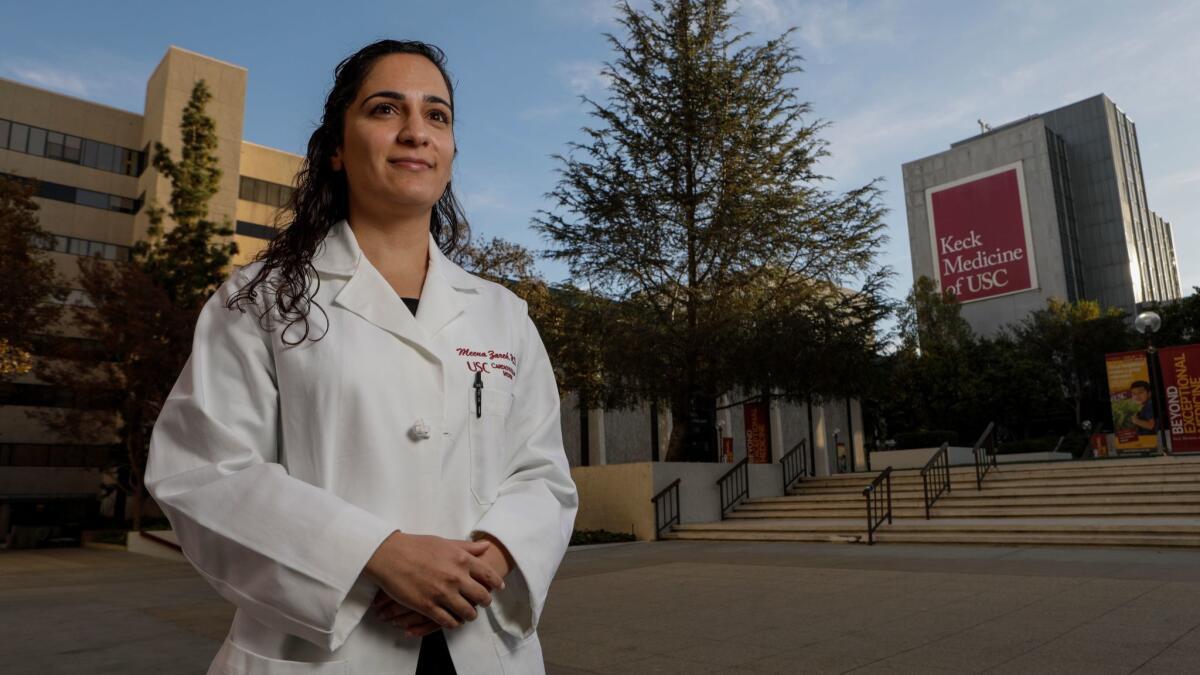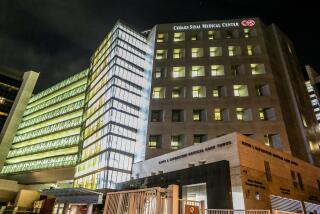State strips medical license of UCLA doctor accused of sexually assaulting another physician

- Share via
State regulators have opted to revoke the medical license of a UCLA cardiologist who was accused of sexually assaulting another physician when they both worked at Los Angeles County-USC Medical Center.
The Medical Board of California moved Thursday to strip the license of Dr. Guillermo Andres Cortes, adopting the recommendation of an administrative law judge who heard days of testimony late last year about sexual misconduct allegations. The revocation takes effect in 30 days.
Dr. Meena Zareh had accused Cortes of forcibly kissing her and penetrating her vagina with his finger inside a windowless call room in 2015 at L.A. County’s 600-bed teaching hospital in Boyle Heights. Two other women who worked as doctors at County-USC also alleged that Cortes assaulted them.
Testifying last year in a downtown L.A. hearing, Cortes denied all accusations of sexual assault, saying that he never touched Zareh in the call room that day. Regarding the claims of the other two accusers, Cortes described having consensual sexual relationships with both.
The administrative law judge, Thomas Heller, concluded that Zareh “proved by clear and convincing evidence” that Cortes assaulted her, but he was unconvinced about the other two accusations. Still, Heller believed Zareh’s assault warranted barring Cortes from ever practicing medicine in California.
“The assault occurred in the workplace and violated professional, personal and workplace boundaries,”Heller wrote in his decision.
“To say that he can’t practice medicine again is pretty excessive,” said Cortes’ attorney, Peter Osinoff. “There have been no patient complaints against him. The board revoked his license without placing him on probation or having him evaluated for fitness to practice. ... How they can find he is too impulsive to be trusted with patients is way over the top, in my mind.”
Zareh told friends and family shortly after the alleged assault, then lodged a complaint with administrators in her residency program about three months later. What followed, she said, was retaliation: Administrators pressured her to delay her medical education or pursue her studies outside USC.
She ultimately filed a civil suit against the county and USC, which is pending. The Medical Board did not learn of Zareh’s accusation against Cortes until after The Times published a report on her lawsuit in 2018.
“I’m very happy with this decision. It sends a message that sexual assault by anyone including doctors is illegal and will not be tolerated,” Zareh said in a statement after the Medical Board announced its decision.
She accused USC and L.A. County of silencing her. “As long as these institutions engage in such practices, female patients, healthcare providers and workers will not be safe from such assaults,” she said.
Michael Wilson, a spokesman for L.A. County, said the Department of Health Services “took immediate action” after learning about Zareh’s allegations against Cortes. The County declined to comment further, citing the ongoing litigation.
A spokeswoman for USC’s medical school said the university “takes allegations of inappropriate conduct very seriously” and described the response to Zareh’s complaint as “appropriate.”
“We are glad that the Medical Board has vindicated Dr. Zareh’s complaint,” said Leslie Levy, Zareh’s attorney.
Zareh had testified in the hearing last year that after she met Cortes in 2012, she discovered their shared interest in professional soccer and cardiology. Although she found him physically attractive, the two did not date or have a sexual relationship, she said.
On Nov. 17, 2015, Zareh, then a third-year resident, sought out Cortes on the hospital’s fourth floor so she could give him a recommendation about a critically ill patient, she said. He gestured for her to walk toward the call room and, inside, he set up his phone so he could continue watching a soccer game. Zareh said they briefly discussed the patient, but when she turned to leave, he stood in the doorway and pushed her arms to her sides, she said. Cortes overpowered her, she said.
She said “no” and “stop,” pleading with him to no longer touch her. “Please, let me go,” she recalled saying.
“I could not believe this was happening,” Zareh said in a previous interview with The Times.
The attack, she said, lasted about three to five minutes.
Cortes testified that no attack ever took place. Instead, he said he wanted to go into the call room to watch the soccer game, and that Zareh inquired about her cardiology fellowship application. Cortes said he told her that USC would not be a good match for her because it was a more clinically focused program and she appeared to prefer research.
Heller, the administrative judge, cast doubt on Cortes’ account. He noted that Zareh was clear, detailed and composed in relaying her experience, and that her telling a friend soon afterward bolstered her credibility.
“It is not believable that [Zareh] would completely fabricate a midday sexual assault at the hospital just because [Cortes] said USC was not a good cardiology fellowship match for her,” Heller wrote.
The case was referred to authorities for a criminal investigation, but in 2017, the L.A. County district attorney’s office declined to file a felony charge of penetration by force. A deputy district attorney said the case lacked enough evidence “at this time,” according to a memo obtained by The Times.
Cortes left USC and pursued further graduate studies in cardiology in a paid post at UCLA’s David Geffen School of Medicine. He was suspended with pay in May 2018 after regulators first moved to revoke his license. He remains on paid leave.
A spokesman for UCLA said a medical license is required for the graduate post, suggesting that once the Medical Board’s revocation takes effect next month, Cortes will be barred from continuing.
Osinoff, the attorney who represents Cortes, said his client is still deciding whether to ask the Medical Board to reconsider, or petition an L.A. County Superior Court judge to review the finding.
More to Read
Sign up for Essential California
The most important California stories and recommendations in your inbox every morning.
You may occasionally receive promotional content from the Los Angeles Times.










